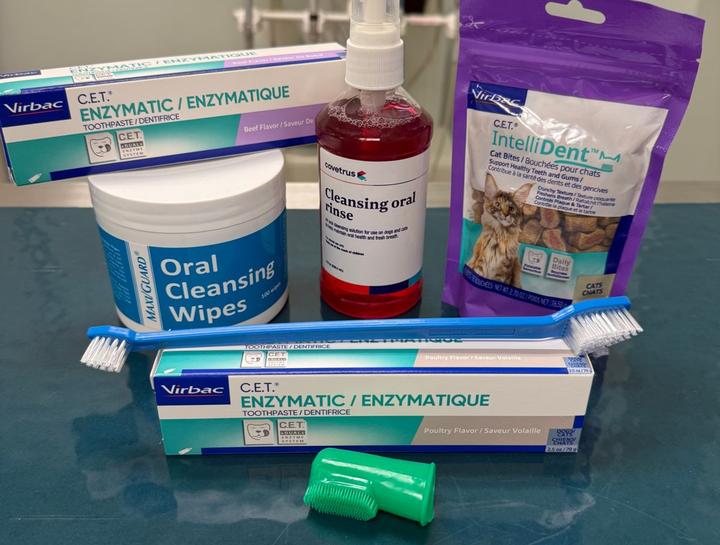Preventive Dental Care
Routine dental care matters.
How can I help my pet maintain good oral hygiene?
The best way to make sure your pet’s teeth remain healthy is by having routine annual exams. Whether you have a puppy or kitten with a mouth full of baby teeth or an adult pet whose teeth need to be checked for plaque, tartar, or dental disease, having a veterinarian examine them is the first step to making sure they’re in good health.
During your pet’s comprehensive physical, your veterinarian will perform a dental health assessment and make recommendations for preventive care. Sometimes this will mean performing good home preventative care, other times, it will mean scheduling an appointment for a dental cleaning or extraction.
Although we recommend brushing your pet’s teeth daily as part of a good preventive care routine, we understand that it’s not always possible. Luckily, there are other ways to maintain your pet’s oral health when you can’t brush their teeth.
- Utilize water additives
- Give your pet a dental chew every other day
- Choose food and treats that control plaque and promote dental health
- Schedule dental cleanings as recommended by your veterinarian
Dental cleaning
Unlike when you go to the dentist, to get the best evaluation and dental care, our pets need to be anesthetized during their dental procedure. Anesthesia is necessary because it allows your pet to be still so our veterinarian can conduct a thorough examination of the whole oral cavity (including below the gumline), take x-rays (to look for “hidden diseases”), and fully and safely clean your pet’s teeth. This also ensures a safe and comfortable experience for your pet by reducing their level of anxiety, stress, and pain. In addition, it protects their airway from any water or debris caused by scaling away the dental plaque and tartar during the procedure.
The Procedure
During the dental procedure, our veterinary nurses will remove plaque and tartar from the teeth and polish them. They will also use a dental probe (like the one your dentist uses on you) to look for pockets of infection around the tooth roots and in the gum. This lets them check the health and stability of the dental ligaments and bony structures beneath the gumline. Dental x-rays are taken to fully evaluate the periodontal health of your pet’s mouth and to make sure that no “hidden” disease is present and waiting to flare up (like brewing tooth root infections or resorbed tooth roots). If your veterinarian finds damaged teeth, they may recommend extractions (removing the teeth) or other procedures as necessary.
Call us at (410) 326-4300 to schedule your pet’s oral health assessment or dental cleaning.

